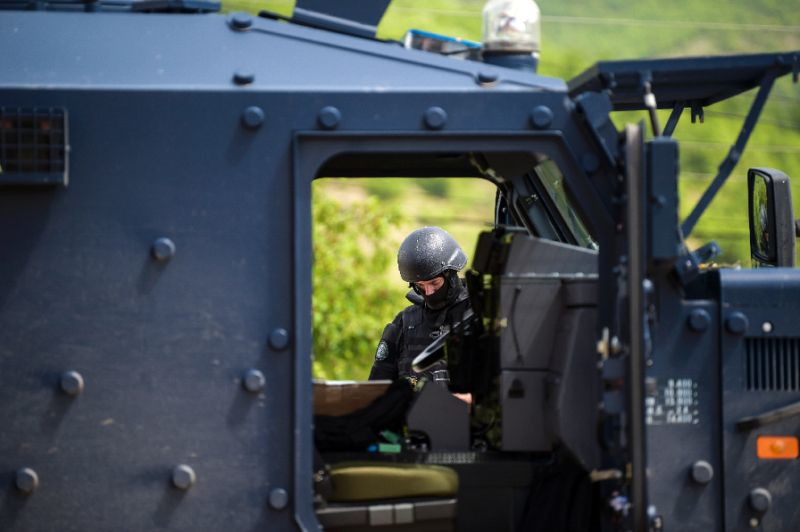
Members of the Kosovo Police Special Unit arrested local officers among the suspects (AFP Photo/Armend NIMANI)
Pristina (AFP) – Kosovo police arrested more than a dozen fellow officers as part of a crackdown on organised crime in the mainly Serb north on Tuesday, triggering concern from the UN, which said two of its staff were injured.
Police said they met “armed resistance” during the early morning operation in the mainly ethnic Serb north region of Kosovo that flanks the porous border with Serbia, a hotspot for smuggling.
Two police officers behind the raids were wounded by gunshots while three others were injured in clashes when they tried to remove barricades erected by locals, police said.
Police director Rashit Qalaj told reporters his force had arrested 19 police officers and nine civilians for offences including smuggling goods, organised crime, bribes and abuse of power.
Seven others were detained for “preventing police from performing their duties”, he added.
The UN mission in Kosovo (UNMIK) said two of its staff were detained during the raids while carrying out their duties. They were “subsequently transferred to hospital for treatment of injuries”.
One member of staff, a Russian national, was later released, UNMIK said.
Moscow had slammed his detention as an “outrageous act” and violation of his diplomatic immunity.
According to police director Qalaj, the UN staff were in a vehicle with UNMIK plates that was being used as part of a “barricade” in the Serb town of Zubin Potok.
By midday the town appeared calm, although several shops had broken windows and scraps from the barricades, including burned tires, remained scattered on the ground, an AFP reporter noted.
Kosovo’s customs department said four of its officers were among those arrested.
– Belgrade army ‘on alert’ –
Since breaking away from Serbia in a 1998-99 war, the Kosovo authorities have struggled to exercise clout in the northern ethnic Serb communities, who remain loyal to Belgrade.
This operation put more pressure on the already tense relations between the two sides.
In Belgrade, Serbian President Aleksandar Vucic told parliament he had put all units of the army on alert, a command he routinely gives during spikes in tension with Kosovo.
“I guarantee you if an escalation of the conflict occurs, if an attack against the Serbian people occurs, Serbia will win,” he added.
But one of his opponents, right-wing politician Miroslav Aleksic, accused Vucic — and his Kosovo counterparts — of stirring up the tensions as “theatre” aimed at shoring up public support for a plan to eventually recognise the former province’s independence.
The neighbours are under pressure from Brussels to normalise ties if they want to advance towards possible EU membership.
But diplomatic rows keep derailing talks.
On Monday, President Vucic repeating a warning that he would not officially return to EU-led negotiations with Pristina until Kosovo lifted a 100-percent tariff slapped on Serbian goods last November.
The tax was a retaliation for Belgrade’s efforts to thwart the global recognition of Kosovo.
Around 100 countries, including the US and much of Western Europe, have recognised Kosovo’s statehood.
But Belgrade allies Moscow and Beijing reject it, effectively barring Pristina from a seat in the United Nations.
On Tuesday KFOR, the NATO-led troops tasked with protecting Kosovo for the past two decades, called for “calm” and said it was monitoring the situation.
Kosovo’s 1998-1999 independence war claimed more than 13,000 lives, mostly ethnic Albanians, and led to a humanitarian and refuge crisis with almost one million people fleeing for neighbouring Albania and Macedonia.
